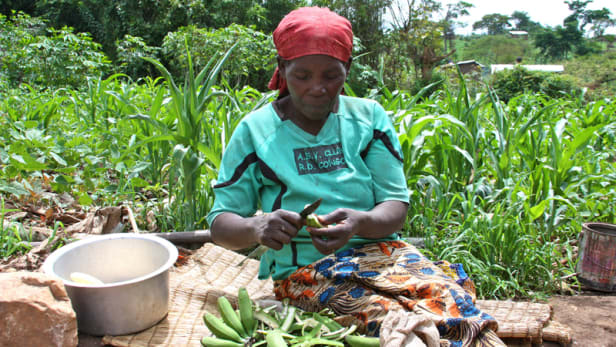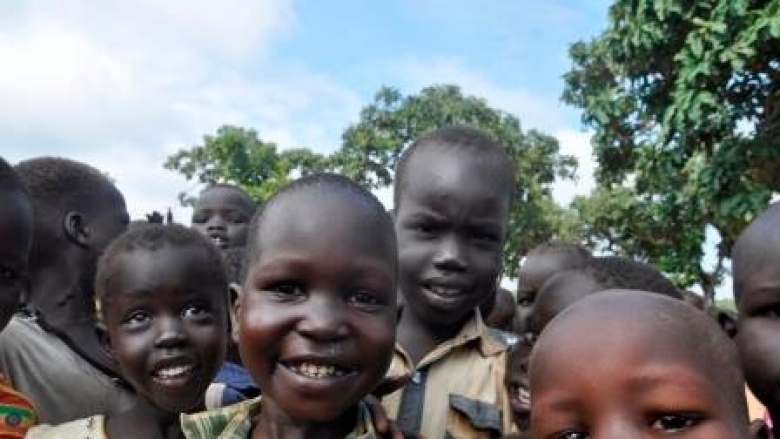The third largest refugee-hosting nation in Africa is unusually welcoming. Refugees in Uganda get a plot of land and are allowed to work, start a business and settle where they want: Many stay for years or even decades. The policy has received high praise from the U.N. refugee agency, which considers prospects for self-reliance and independence in Uganda among the best in the world.
In the settlements, scattered among Uganda’s nine refugee-hosting districts, about 30 percent of refugee funding goes to host communities. Host communities can also access services primarily targeting refugees. Nsamizi, a vocational training institute and UNHCR’s livelihoods partner in Nakivale settlement in the southwest, has worked with some 230 cooperatives in recent years. Nearly a quarter of those cooperatives count both Ugandans and refugees among their members, according to Nsamizi project manager Jimmy Maguru.
It’s a clearer now than ever that refugees are likely in Uganda to stay, and the new Refugee and Host Population Empowerment framework, known as Rehope, could make for more equal treatment of long-term refugees and poor host populations. But the framework will create new coordination challenges, raise new questions around who might lose out and stir possible resistance to changing the status quo.
Still, the country’s new Rehope framework takes integration up a notch. Initiated this year by UN agencies and the World Bank, the five-year, $350 million plan aims to promote self-reliance among both refugees and host communities. Long treated separately, the two groups will increasingly be handled by the same programs.
Closing the development-humanitarian divide
Under Rehope, basic services for refugees will be embedded in local government structures. Most primary schools in settlements are already integrated within Uganda’s systems, Douglas Asiimwe, assistant commissioner for refugees at the Office of the Prime Minister, told Devex. UNHCR currently manages Nakivale’s only secondary school, but the government will eventually take over operations. Water services will similarly be handed to the district authority, meaning refugees will eventually pay local prices.
Such changes may require more communication as refugees transition to paying for services, said Eunice Ohanusi, UNHCR’s external relations officer in Nakivale. They might not understand the difference between urgent and longer-term support, Ohanusi said, and “may try to resist the efforts of Rehope [due to the] dependency syndrome that is common in the settlements.”
The major focus of the new approach, though, is livelihoods, reflecting just how much the refugee response has evolved. UNHCR’s goal is no longer to ensure protection alone, said Charlie Yaxley, the agency’s spokesperson in Kampala, but also self-reliance and independence. “Our expertise is not in development,” he said. “[We need] to bring in development partners who have that expertise already.”
Among the new partnerships underway are an unprecedented training program in sustainable farming and fishing with the U.N. Development Program; a partnership with Yunus Social Business to support agricultural and non-farm income generation; and a public-private partnership funded by the Japanese International Cooperation Agency to facilitate market access for rice.
Such efforts will be welcomed by advocates of closer coordination between development and humanitarian aid, particularly relevant for UNHCR’s work with the long-term displaced.
“One of the issues with humanitarian funding is budgets are done on a year-by-year basis,” said Yaxley. The timeline isn’t always effective for livelihoods work, he said, which can take years to show results.
Those working with refugees hope that Rehope will attract new funding. With humanitarian appeals in the region drastically underfunded, food and shelter are prioritized, said Yaxley, while longer-term support for livelihoods or education “falls by the wayside.”
Most finance has yet to be raised for Rehope: the World Bank pledged $50 million in loans in May, and some funding has been committed of the remaining targets ($170 million in joint U.N.-World Bank program funding and leveraging existing development funding worth $130 million). Yaxley declined to give details but said donors have indicated “strong support.”

Better for livelihoods?
Despite some evidence of high levels of self-employment, refugees struggle to make their enterprises work: they commonly face language barriers, xenophobia and a lack of contacts to help them get started. Rehope’s focus on livelihoods may be less of a priority for more vulnerable refugees with other needs: the vast majority of this year’s arrivals from South Sudan are women and children.
But Yaxley said Rehope is not a blanket policy. “It’s not about homogenizing the two communities together — more about seeing the development of the two as linked,” he said. Attention to the most needy refugees will continue, he added: implementing organizations regularly conduct vulnerability assessments.
Charity Ahumuza, a program manager at the Refugee Law Project at Makerere University in Kampala welcomed the new approach — with reservations. Neither Rehope nor the Ugandan government’s self-reliance strategy properly considers the diverse profiles of refugees, she said: the overemphasis on farming or technical skills such as tailoring or mechanics overlooks the many who are already professionally qualified. “What happens to this category?” she asked. “If we don’t focus on their skills, we are losing something.”
Some refugees in Nakivale echoed this, saying the experience of doctors and teachers was being wasted.
“Our certificates are not recognized here, [so] we can’t compete with nationals,” said Kalala Mpendano Awake from the Democratic Republic of the Congo, who said he gave up a teaching job in the settlement because his wages were much lower than those of his Ugandan colleagues.
Long-term, though, Rehope may work in favor of professionals: Asiimwe told Devex he wants to look into making public service jobs — currently only open to Ugandans — accessible to refugees.
‘Good neighborliness’
For Ahumuza, the main benefit is integration. Some facilities such as hospitals are already accessible to both groups; Rehope formalizes such arrangements, seeking to “promote peaceful coexistence [by helping] to counter perceptions that refugees are treated better,” Ahumuza explained.
The “few cases of resentment” seem to arise where local communities believe refugees are getting preferential treatment, said Juliet Nakato, director of programs in Uganda at the development organization ACORD International. Joint livelihoods programs would help promote “good neighborliness,” she said.
But with the number of new arrivals rising sharply — conflict across the border has driven 90,000 civilians from South Sudan to Uganda since early July — the pressure is mounting. In Adjumani district in the North, the population of refugees almost equals that of Ugandans, according to Ugandan media. That creates “a lot of competition for resources, and depletion of the environment,” said Justus Muhwezi, a program manager for ACORD based in the region.
Ugandans are generally “quite positive” toward refugees, Ahumuza said, with communities agreeing to give up land for new arrivals. But rising numbers are a concern: the Refugee Law Project is planning education activities this year to help ensure attitudes remain favorable.
For refugees, the transition from handouts to self-sufficiency may be tough. The flipside, though, as Ahumuza put it, would mean “breaking [down] perceptions that refugees are different to us.”
©devex



